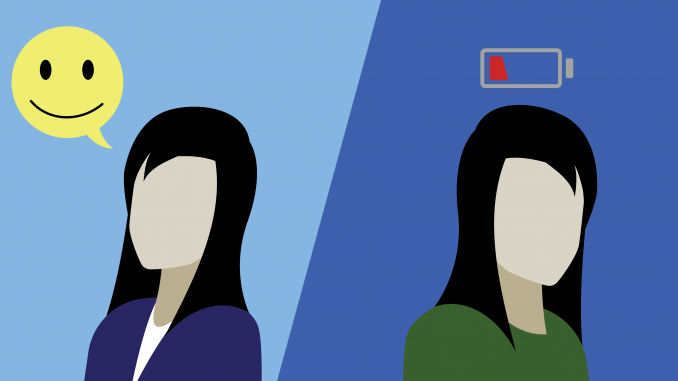
Watching her friends and her stay-at-home mom provide emotional support to others, Lana Mansour understood how it works, but did not know it had a name — emotional labor.
“The idea, I’ve heard of it, but I’ve never heard about emotional labor as a term,” said Mansour, a senior finance major. “My mom is always on her feet and working. It’s literally a job. I mean, she has to take care of people, has to take care of the house, that type of stuff.”
Coined by Arlie Hochschild, a sociologist and professor at the University of California at Berkeley in her 1983 book “The Managed Heart.” Emotional labor involves tasks that could be seen as “mental work” causing distress or disturbance, Hochschild said in a 2018 interview with The Atlantic.
Suzannah Weiss, a feminist writer with work featured in The New York Times, The Washington Post, Teen Vogue and more, wrote about how emotional labor relates to women and their relationships with others.
“Emotional labor is work that has to do with supporting people emotionally — things like allowing people to confide in you, perhaps taking care of other people, giving people advice, listening to people’s problems,” Weiss said.
Mansour frequently witnesses this type of labor at Temple, she said.
“A girl might have three of her friends coming to her, and then she makes their problems her problems,” Mansour added.
In short, emotional labor is behind-the-scenes work — actions that tend to go unnoticed but still are expected, according to the New York Times.
It also includes keeping track of social calendars, family schedules, people’s birthdays and other seemingly small tasks, said Amanda White, a professional women’s therapist and founder of Therapy for Women in the Philadelphia area.
Women complete 2.6 times more unpaid domestic care or emotional work than men do, according to a 2018 study by United Nations Women, a division of the United Nations that works for gender equality and female empowerment.
Weiss believes this pattern stems from the way men have been raised and socialized, adding she mostly sees heterosexual couples struggling with issues concerning emotional labor.
“I think it’s due to men not learning to manage their emotions or other people’s emotions and so they are relying on women to do so,” Weiss said. “We also do a disservice to men by expecting women to do all the emotional labor because then they never learn to deal with emotions. They don’t get the chance to do that.”
Alison Baren, an assistant psychology professor at Temple, said these gender roles could be evolutionary.
“If you think about it from a biological standpoint, of cavemen and women, the women were the caregivers,” Baren said. “It could be something in our DNA that opens us [women] up to more emotional experiences.”
Most children see women as emotional caretakers, Mansour said.
“We grew up with that mindset,” Mansour said. “You know, you’re in first grade and you fall down — [women] are the first ones you go to. They take care of you.”
Because emotional labor happens more to women, the term is important for women to know and utilize for themselves, White said.
“We get power when we have a word for our experience,” White added. “And when we don’t have a word for our experience there isn’t a lot of action we can take because we don’t fully understand what’s happening.”
The term can be especially helpful for people of marginalized groups who end up having to do a disproportionate amount of emotional labor, “especially when it comes to explaining their own oppression to people and teaching people how to be respectful,” Weiss added.
With emotional labor, White hopes people can recognize and address their emotional issues as well as share their stories with others.
“It’s important for women to know that they don’t have to do free emotional labor for people,” Weiss said. “You don’t owe anyone any of your time.”


I guess when I do it, it doesnt count because In a white male